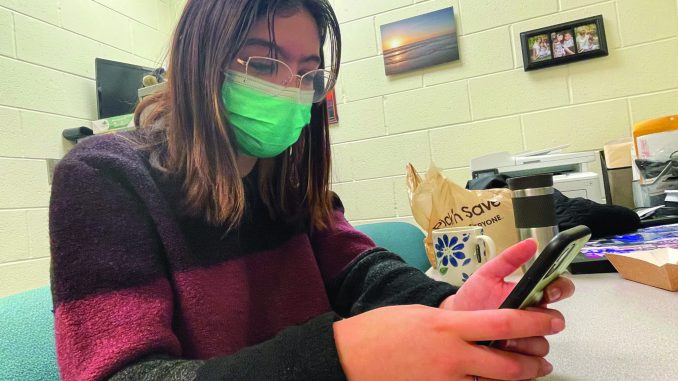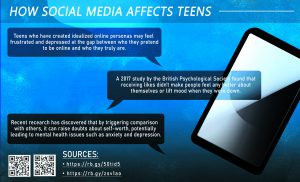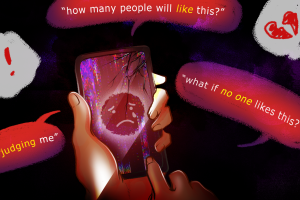
General studies senior Julianne Nunez checks her phone before her lunch period ends. “Social media is very complex,” Nunez said. “It’s been good in spreading information and positive messages, but it’s also been really harmful with beauty standards and people have become so comfortable with saying whatever they think, even if it’s incredibly harmful or hurtful.”
Photo by Elly Herrick, Editor-in-Chief
Illustrations by Samantha Mandujano, Chief Illustrator
Article by Katlyn Marotz, Co-Editor-in-Chief

Indian Trail High School teens support greater restrictions on social media use by young children after seeing the negative effects it has on themselves and their peers.
A bipartisan group of U.S. lawmakers recently introduced legislation to take action against the negative impacts of technology on the mental health of children after a Wall Street Journal investigation exposed that Facebook’s research showed Instagram poses serious danger to the mental health of teen girls.
While IT students say social media has both positive and negative impacts on children, several teens interviewed agree the government needs to put stronger limits on apps that target young children.
“It can be really harmful with the way that beauty is portrayed and the standards that are set,” Julianne Nunez, an IT senior said. Nunez said she believes phone addiction among teens is very real and leads teens to feel disconnected from life. It affects her as well. Her screen time for a day ranges from three to ten hours.
“On social media a lot of things are faked, and even influencers say this, but not a lot of people are really trying to break that standard and move away from it.” Nunez said.
She added that this can force teens to grow up faster than needed and change who they are as an individual.
About 32% of teenage girls said Instagram worsened their body image even further, and 14% of teenage boys said Instagram made them feel bad about themselves, according to a Sept. 2021 report from The Wall Street Journal.
In a January 2022 survey of Indian Trail students regarding social media, teens anonymously shared their inner thoughts about social media’s effects.
“When I post something, I get super insecure about whatever it is I am posting afraid of what other people will think,” one IT student wrote. “Sometimes I will stare at a post for too long and find some random flaw and delete it. I am constantly worried about what other people will think of what I am posting.”
And, Instagram’s Explore page has pushed some users into posts that can be destructive by using addictive strategies like only loading certain photos or topics, the Wall Street Journal reported.
In February, the Kids Online Safety Act was introduced by lawmakers which will give children under 16 years of age and parents controls to limit screen time and protect their data, and to overall keep children safe from social media’s effects. The legislation followed multiple hearings and investigations regarding how tech companies were or weren’t safeguarding children.
IT senior Zarina Atambaeva said she uses social media daily including apps such as Twitter or Instagram, and grew up around it predominantly in middle school.
She said social media can have a positive impact, but it affects children mostly negatively.
“It’s fun to post and be able to reach your friends and send pictures to each other but I feel it can also make people feel very insecure especially with the things we all see on media,” Atambaeva said.
About 45% of U.S. teens are constantly on social media, according to a 2019 Pew Research Center study.
“Sometimes, when people post me on social media, like in Snapchat stories, I feel included and loved,” an anonymous IT student said. “It’s nice that I get to be shown and be a part of that person’s life. It’s just that surprise, wow, that’s me!”
She said that social media leads to kids feeling left out and insecure, and having harmful thoughts.
Social media will affect future generations and how society functions greatly, she said, because social media is one of biggest “money makers” in the world, especially with how advertisers hav monetized the technology.
Atambaeva said she believes a good rule of thumb is to give children access to a phone once in middle school, rather than around age 7 or 8.
Senior IT student Amanda June uses plat- forms such as Snapchat or Tik Tok most often, and said she feels like social media hasn’t made a big impact on her mental health because she mainly uses the platforms for communication.
But she said it becomes a very toxic environment for other teenagers and children.
“I felt like I needed social media to be liked and connected to people in a way that I really found out I didn’t. I had social media and soon started to realize how much of a problem it was,” said another IT student, who asked to remain anonymous.
Facebook had planned to start building a version of Instagram for children under the age of 13, but the plan was inevitably put on hold in light of reports of dangerous effects from social media, by law enforcement and policymakers.
“I would change the age requirements,” June said. “All these young kids are getting social media and are being exposed to so many harmful accounts and people that can easily take advantage of them. They don’t know better, so most kids will assume that social media is all positive.”
“Children don’t have a well enough developed brain to be able to declare right from wrong. There are also things in social media that just aren’t for younger audiences, resulting in a negative impact,” June added.
“Beauty and social standards aren’t real,” Nunez said. “Differences in people are what keeps us growing as a society and as individuals. The most important thing is to make sure you’re happy with who you are in the way that makes you feel the most you.”


